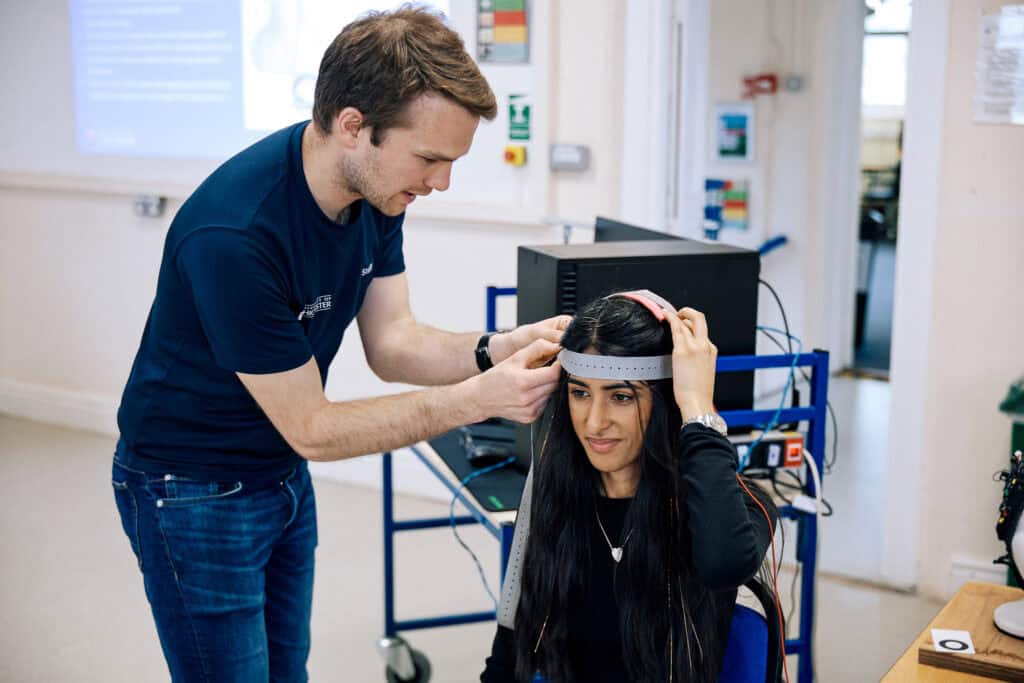Top 30
UK university out of 122 institutions
Guardian University Guide 2025
Gold
rated university in the Teaching Excellence Framework
Teaching Excellence Framework 2023
10th
in the UK for graduate prospects in Psychology
Complete University Guide 2025
Overview
Stand out from the crowd with this innovative programme, carefully crafted to develop skills in clinical neuropsychology practice and research
Our MSc Neuropsychology programme focuses on the connection between biology and human behaviour, including the assessment and treatment of neurological conditions and brain injury.
You will learn the fundamental underpinnings of neuropsychology, including neuroanatomy, cognitive neuroscience, advanced research methods and clinical skills such as assessment, formulation and intervention. You will also gain hands-on experience, undertaking your own research project and presenting the findings at our research conference.
By the end of the programme, you will be equipped with the expertise and skills required to progress in the areas of applied clinical work or clinical research careers.
Learn with the experts
Whether you’re a recent graduate or a professional aspiring to advance in your clinical or research career, our MSc programme is crafted and delivered by research-active academics. This ensures you receive state-of-the-art training and education to succeed in the field of neuropsychology.
We will supervise you as you design, implement, write and present your own novel research project, ensuring you have the skillset to apply the theoretical elements of the course in practice.
The Course
What you will study
This one-year distance MSc integrates neuropsychology, neuroscience and advanced research methods to create a cutting-edge programme that can help you develop the essential skillset required for clinical and researched based careers.
Unlike other courses in psychology and neuroscience, this programme not only aims to develop your academic knowledge and skillset, but also to give you the opportunity to develop personally, as you consider what it means to be an ethical and self-reflective practitioner.
Modules
Neuroanatomy and Neurophysiology
The aim of this module is to provide you with a strong foundational understanding of neuroanatomy and neurophysiology, delving into the intricacies of the human brain and nervous system. You will explore topics such as brain regions, neural pathways, neurotransmission, and neural coding.
You will be assessed through a range of in-class and independent learning activities, including oral presentations, working with data, planning or proposal writing, in class or forum discussions and critical reading activities.
Cognitive Neuroscience
This module will explore the intricate relationship between human cognition, emotion, decision-making processes, with an emphasis on understanding these processes from a neuropsychological perspective. This dynamic module offers a comprehensive understanding of the neural mechanisms that influence cognitive functions and behavioural responses.
This module will be assessed through a range of in-class and independent learning activities, such as oral presentations, working with data, planning or proposal writing, in-class or forum discussions and critical reading activities.
Clinical Neuropsychology: Professional Skills
This module is designed to equip you with theoretical knowledge of neuropsychology and learn about applied skills needed for employment in a related field (e.g., assessment, case formulation and neurorehabilitation). The module combines theoretical knowledge with practical application, covering topics such as neuropsychological conditions, assessment methods, and case formulation. You will engage in practical exercises to support the development of your skills.
You will be assessed through a range of in-class and independent learning activities such as undertaking oral presentations, working with data, planning or proposal writing, in class or forum discussions and critical reading activities.
Coaching for Health and Well-being: Individual and Ecological approaches
This module explores the different coaching approaches to improving physical health, mental health, and enhancing well-being, ranging from “goal oriented” approaches such as CBT, ACT, and solution-focused coaching, to more “meaning making” approaches, such as positive, existential and ecological coaching.
You will develop a range of cognitive, behavioural, imaginal and problem-solving skills associated with these approaches such as: relaxation techniques, motivational interviewing, Socratic questioning and storytelling.
A variety of teaching methods will be employed, including lectures, student led learning, skills’ practice, discussions based on prior reading, practical exercises, and self-reflections.
Advanced Research Methods and Approaches 1
This module will provide you with an in-depth and critical understanding of advanced applied research design and associated analytical techniques, allowing you to develop your use of cutting-edge applied research skills in psychology and criminology.
The module will enhance your knowledge, effective problem solving skills, self-directed learning, and effective collaboration skills through a diversified range of learning activities.
Advanced Research Methods and Approaches 2
This module is designed to equip you with a wide range of methodological skills, allowing you to become successful professional researcher in psychology and criminology.
The module will enhance your knowledge, effective problem solving skills, self-directed learning, and effective collaboration skills through a diversified range of learning activities.
Independent Project
The dissertation will show evidence of your ability to: identify problem areas, locate issues within a wider context, obtain relevant data, analyse findings, work within relevant theoretical/conceptual frameworks, synthesise complicated material, employ relevant and innovative research approaches, and present findings in an accessible manner with appropriate technical apparatus.
This is an independent piece of work, but will be conducted under appropriate supervision from your tutor. The content of the module will be primarily determined by you, under the guidance of the supervising tutor.
Teaching and Assessment
How you will learn
Be part of a close-knit community
The ‘action learning’ process plays a crucial role in this programme and thus offers a solid platform for you to collaborate with peers, share insights and connect with them in a friendly and supportive atmosphere.
Distance learning
We understand that studying around other commitments can be challenging and therefore we have aimed to make the programme of study accessible by choosing an online platform for delivery.
This means we will participate in lectures and workshops together using Teams with some optional on-site face-to-face sessions at Bishop Otter (Chichester) or Bognor Regis campus.
The content will be taught through a blend of lectures, seminars, workshops, student-led learning, action learning groups and problem-solving work.
Although the delivery is online you are still very much part of the University of Chichester and will have access to the campus, library, café and other services such as careers and the wellbeing team.
You could choose to do a research project that can be run online; however, you also have access to our laboratory and lab equipment (e.g., eye tracking, tDCS and fNIRS) if you would like to conduct the study on-site.
Rigorous assessments
We want you to get the most out of the course developing not only knowledge and skills but personal attributes such as resilience and self-reflection.
The mode of assessment will differ across our modules and will include a range of activities such as case studies, presentations, take home exams and portfolios.
More information has been provided in the description of the modules.
Meet the Programme Coordinators
Rachel King
Rachel is a senior lecturer in biological psychology who has a DPhil in Experimental Psychology from the University of Oxford.
She is a postdoctoral researcher in the Cognitive Aging and Dementia Laboratory with an interest in dementia, methods for enhancing neuroplasticity and interventions that can improve the quality of life.
She is also the psychology laboratory and technology lead and plays a key role in developing research impact within the department.
Facilities
Use industry standard equipment
Our facilities will help you get the very best from your studies throughout the MSc Neuropsychology degree programme.
Specialist Advanced Research Software
Within our lab we have available lab equipment and associated softwares such as EEG, fNIRS, eye-tracking and biometric measurements. We also have access to software such as Inquisit, Psychopy and Python for experimental designs and Pavlovia for survey-based work. For statistical analysis we will use R or JASP. Wherever possible we will aim to use open-source software to enable the transferability of skills.
Learning Resource Centre
Each campus has a Learning Resource Centre (LRC) which contains the library, a café, IT/teaching rooms and the Support and Information Zone (SIZ)
Library
Our campus libraries hold more than 200,000 books and over 500,000 eBooks.
Careers
Where you could go after your studies
A career in neuropsychology and the people professions
An MSc in Neuropsychology offers a strong foundation for a variety of career paths, ranging from direct clinical work with patients to academic roles that combine research and practice. The programme can also open doors to industry-based and clinical research careers.
Potential next steps include:
- Clinical doctorate
- Neuropsychology PhD
- Academic researcher
An MSc in Neuropsychology equips you with the skills and knowledge required to make meaningful contributions to both the academic community and patient care.
Transferable skills:
- Neuropsychological assessment
- Case formulation
- Research design
- Data analysis
- Problem solving
- Technical skills with lab equipment
- Critical thinking
You will graduate with transferable skills suitable for working in sectors outside psychology. Above all, we will teach you how to take complex information, technical methods and metrics and produce actionable insights.
Course Costs
Course Fees 2025/26
UK fee
International fee
For further details about fees, please see our Tuition Fee page.
For further details about international scholarships, please see our Scholarships page.
University of Chichester alumni who have completed a full undergraduate degree at the University will receive a 15% discount on their postgraduate fees.
To find out about any other additional costs, please see our Additional Costs page.
Entry Requirements
Typical entry requirements
Having the relevant skills and qualifications helps us to know that you’re ready to start the course. You’ll need to meet certain entry requirements when you apply for this course:
- A minimum of a 2:2 (hons) degree (in the areas of Psychology, Biology, Neuroscience, Clinical Psychology or a related subject).
- An academic reference
- A personal statement outlining your interest in neuropsychology
- We would normally expect applicants to have Grade 4 / C in GCSE English and Maths
- All suitable applicants are required to attend an interview
- An enhanced DBS check.
If English is not your first language, you will need IELTS 6.5 overall (with no element lower than 5.5)
Non-standard entry with evidence of further study or relevant work experience will be considered so please do reach out if you would like to check whether you would be eligible to enrol on the course.
International students who don't meet the entry requirements
If you are an international student and do not yet meet the entry criteria for this course, you may be eligible for our International Premaster’s Programme. This is a one-semester programme that allows you to progress onto a master’s course at the University of Chichester.
Contact
Are you interested in this course and would like to learn more? Please email Dr. Rachel King on: R.King@chi.ac.uk for admissions queries.



